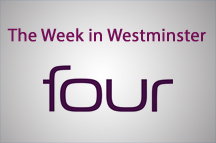 Although Brexit continues to dominate the headlines, legislative agenda and much of the Government’s resources, there were a number of other major issues that featured this week in the world of Westminster politics.
Although Brexit continues to dominate the headlines, legislative agenda and much of the Government’s resources, there were a number of other major issues that featured this week in the world of Westminster politics.
The week kicked off with a reiteration of the Government’s ambition to build 300,000 new homes per year. To demonstrate this commitment, the questionable decision was taken for the Prime Minister to launch the new national planning framework in front of a mocked-up brick wall, much to the derision of social media users. After the infamous staging disaster of the 2017 Conservative Party Conference, Theresa May will be irritated that another key speech has been overshadowed by set design, as she quickly became the target for memes and jokes about ‘Bricksit means Bricksit’. Despite this distraction, there was also some reaction to the speech itself, with scepticism evident across Westminster (as well as among Cabinet members) of her ability to deliver on such a pledge.
Focus then turned to reports of an alleged assassination attempt on a former Russian spy and his daughter in the rather surprising location of Salisbury. The case has brought back chilling memories of the murder of Alexander Litvinenko and raised questions about Russian state-sponsored involvement. Whilst details are not yet fully clear, the Government has come under significant pressure to outline what type of response it should make if links to Russia can be proved. Any evidence that this was indeed Russian-sponsored would inevitably see UK-Russian relations plummet into a worse state than they already are.
 On the subject of foreign affairs, PMQs was dominated by the visit of Saudi Arabia's Crown Prince Mohammed bin Salman to Britain. It was hard not to notice the PR-offensive that has accompanied this visit, with billboards, media outlets, and vans covered in pro-Saudi messages. The controversial visit was seized upon by the Labour Party, with Jeremy Corbyn drawing attention to human rights abuses in Saudi Arabia. Under pressure, the Government retorted that topics such as the ongoing war in Yemen and human rights abuses would be raised as part of their discussions.
On the subject of foreign affairs, PMQs was dominated by the visit of Saudi Arabia's Crown Prince Mohammed bin Salman to Britain. It was hard not to notice the PR-offensive that has accompanied this visit, with billboards, media outlets, and vans covered in pro-Saudi messages. The controversial visit was seized upon by the Labour Party, with Jeremy Corbyn drawing attention to human rights abuses in Saudi Arabia. Under pressure, the Government retorted that topics such as the ongoing war in Yemen and human rights abuses would be raised as part of their discussions.
Finally, following May’s long-awaited ‘Road to Brexit speech’ last week, it was the Chancellor’s turn to outline his vision on the future relationship. His speech emphasised that financial services must be a central part of any future trade deal and warned that any fragmentation to London’s financial market will only benefit New York, Singapore and Hong Kong, rather than Frankfurt, Paris or Dublin. The importance of the sector to the UK economy cannot be overstated, given that it is one of the only areas where the UK currently has a trade surplus with the EU. It also demonstrates the difficulties of pursuing a FTA based on the Canada model.
The Chancellor will remain centre stage next week as he delivers his much-anticipated Spring Statement. Whilst expected to be a ‘low-key’ event (no red-box, no tax changes), there will be a great level of focus on the OBR’s estimate of the annual cost of the post-2019 Brexit divorce payments to the EU that were agreed, in principle, by the Prime Minister toward the end of last year.














